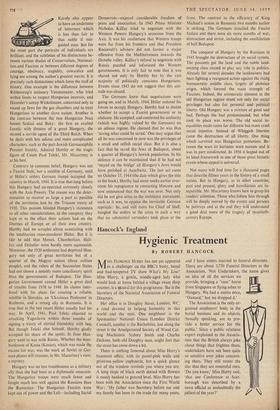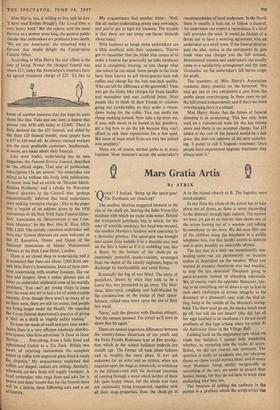Hancock's England
Hygienic Treatment
By ROBERT
HANCOC.K ISS FLORENCE HURRY has not yet appeared as a challenger on the BBC's busty, banal and bad-tempered TV show What's My Line? Miss Hurry, a gentle, middle-aged lady who would look at home behind a village sweet shop counter, is a aa tural for this programme. She is the Secretary of the National Association of Funeral Directors.
Her office is in Doughty Street, London, WC, a road devoted to helping humanity in this world and the next. One neighbour is the Spiritualists' National Union (London District Council), another is the Rechabites, just along the street is the Amalgamated Society of Wood Cut- ting Machinists. Sydney Smith and Charles Dickens, both old Doughty men, might feel that the street has come down a bit.
There is nothing funereal about Miss Hurry's basement offide, with its pastel-pink walls and primrose-yellow cupboards, but a quick glance out of the window reminds you where you are. A long slope of black earth dotted with flowers is neatly banked to ground level. Miss Hurry has been with the Association since the First World War : 'My father' was Secretary before me and my family has been in the trade for many years, The Association is the only or- ganised employers' body in the burial business and its objects, 'broadly speaking, are to pro- vide a better service for the public.' Since a public relations expert explained to the Associa- tion that the British always joke about things that frighten them, undertakers have not been quite so sensitive over jokes concern- ing them. They still resent the slur that they are mournful men. 'Do you know,' Miss Hurry said, 'that our Conference at Scar- borough was described by a town official as undoubtedly the jolliest of the year?' Miss Hurry, too, is willing to live and let live. 'I have read Evelyn Waugh's The Loved One, a very funny book. But she rejects; with the same fervour as a prewar arms king, the general public slander that undertakers are profiteers from death. 'We are not Americans,' she remarked with a fervour that would delight the Conservative Central Office.
AcCording to Miss Hurry the real villain is the cost of living. Prewar the cheapest funeral was about £12; today the Association's members have an agreed minimum charge of £25. 'I'd like to know of another business that has kept its costs down like that. Take just one item, a hearse that prewar cost £450 sells today at £2,000.' There is little demand for the £25 funeral, and aided by the State £20 funeral benefit, most people have a £35 to £40 send-off. As always, manual workers are the most profitable customers. Intellectuals, it seems, are mean about their funerals.
Like most trades, undertaking has its own magazine, the Funeral Service Journal, described as 'the official organ, 72nd year of publication, subscription 15s. per annum.' No undertaker can afford to be without this lively little publication. A recent issue had an article on 'Disaster Identi- fication Problems,' and a rebuke by Worcester funeral directors to the Council who 'perhaps unintentionally' inferred that local undertakers Were making 'excessive charges.' Also in the paper Was a reprint of an address given to the 1956 convention of the New York State Funeral Direc- tors' Association on 'Bereavement is our Com- mon Ministry,' by the Rev. Otis R. Rice, STD, LHD. The socially conscious undertaker will note that 'funeral directors are most welcome' to the £2 Reception, Dinner and Dance of the National Association of Master Monumental Masons at the Park Lane Hotel, London.
There is no closed shop in undertaking and it IS estimated that there are about 7,000 firms out- side Miss Hurry's Association. Most of them com- bine undertaking with another business, like car hire and drapery. Over a rather gloomy pint of bitter an undertaker ekplained some of his worldly Problems. 'You can't get young chaps to come into the trade and we've had a lot of union trouble recently. Even though there aren't as many of us as there were, there are still too many, and people are living longer under the Health.' He regarded the Co-op funeral department's practice of giving `divi' on a death as 'slightly unfair trading.'
To meet the deeds of small and part-time under- takers there is a very efficient wholesale distribu- tive system. One firm advertises 'A Door to Door Service. . . Everything, from a fully fitted and Upholstered Casket to a Tin Tack. Within two hours of receiving instructions the complete casket or coffin with engraved plate fixed is ready for dispatch.' My acquaintance explained that coffins are shaped, caskets are oblong. Similarly, Wholesale car-hire firms will supply transport. A local undertaker who rings them and asks for 'a hearse and three' knows that for the funeral there Will be a hearse, three following cars and a set of bearers. My acquaintance had another bitter : 'Well, this all makes undertaking pretty easy nowadays, and you've got to fight for business. The trouble is that there are too many .cut-throat bastards about today.'
With business' so tough some undertakers are a little unethical with their customers. 'You've got to remember that the bloke who comes in to order a funeral has practically no sales resistance and is completely trusting, so you charge what you reason he can stand. Some people in the trade have been known to sell three-quarter-inch oak coffins and charge for the best one-inch quality. Who can tell the difference at the graveside? Then you get the bloke who charges for brass handles and nameplate and uses artificial brass. Most people like to think of their friends or relatives going out comfortable, so they order a swans- down lining for the coffin. You can easily use cheap wadding instead. Now take a tip from me, if your wife wants to be buried in her jewellery, get a big fierri to do the job because they can't afford to risk their reputations for a few quid. But some of these small firms are very hot indeed over jewellery.'
There are, of course, normal perks as in every business: Most mourners accept the undertaker's recommendation of local tradesmen. In the North there is usually a ham tea to follow a funeral. An undertaker can expect a commission if a local café provides the meal. It would,he foolish of a florist not to have a working agreement ,with, an, undertaker in a small town. If the funeral director puts the obit. notice in the newspapers he gets trade rates and charges you the full amount. Monumental masons and undertakers can usually come to a satisfactory arrangement and the item 'Gratuities' on the undertaker's bill leaves scope for profit.
The members of Miss Hurry's Association condemn sharp practice on the bereaved, 'We may get one or two complaints a year from the public about overcharging. In these cases we get the bill costed independently and if there has been overcharging there is a refund.'
Miss Hurry thinks that the future of funeral directing is in embalming. This has only been used on a commercial scale for the last twenty years and there is no accepted charge, but £25 added to the cost of the funeral would be a fair price. She does not approve of the term embalm- ing. 'I prefer to call it hygienic treatment. Once people have experienced hygienic treatment they always want it.'



































 Previous page
Previous page